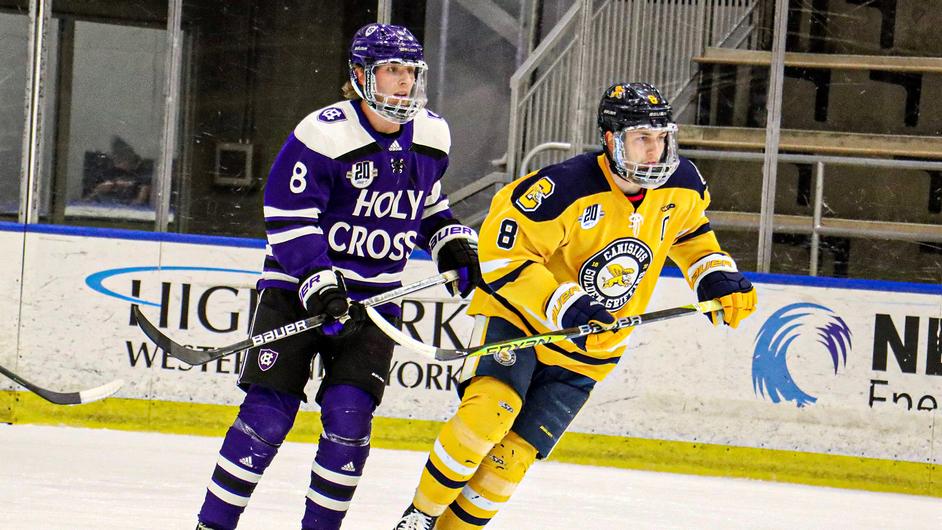
For the last 17 years that I have been covering Atlantic Hockey for USCHO, this final column of the season has looked forward to a championship weekend that involved four teams converging on a single, neutral location.
Things have changed.
The new format adopted by the league this season creates a one-game, winner-takes-all championship, hosted by the top surviving seed.
That means we have fourth-seeded Canisius hosting seventh-seeded Holy Cross on Saturday.
How did we get here?
Under the new format, the semifinals were best-of-three series, and both semis needed that extra third game.
Holy Cross, after knocking off No. 2 American International in three games in the quarterfinals, did the same thing to top-seed Rochester Institute of Technology, defeating the Tigers 5-1 in the deciding game on Sunday.
Not bad for a team picked to finish last in the preseason coaches poll.
Sophomore forward Liam McLinskey stayed hot, scoring four goals in the series, including the overtime game-winner on Friday.
He has nine goals in six postseason games so far.
Grayson Constable scored twice on Sunday, including the game-winner.
“We found a way,” said Crusaders coach Bill Riga in a postgame interview after the deciding win on Sunday. “We found a way to put a few in the net and that third goal by Grayson was just tremendous work on the forecheck, a big goal going into the third period there.”
In Buffalo, Battle of the Bridge rivals Niagara and Canisius went the distance in their semifinal series, with the Golden Griffins triumphing in three games.
Canisius goaltender Jacob Barczewski was stellar in net, making 86 saves in the series. So far in the playoffs, he has a 1.33 GAA and a .923 save percentage.
“I thought Niagara was really sharp at the start,” said Canisius coach Trevor Large after Sunday’s 4-2 win to clinch the series. “We had to weather that for a little bit. But I liked our response.”
Butts in seats
Attendance each day for the two semifinal series:
Canisius: 546, 500, 457.
RIT: 2442, 2622, 1932.
Last year’s semifinal attendance in Utica (one ticket for two games): 1072.
So far, this format change looks like a success in terms of crowd size and therefore revenue generated.
Not enough
RIT ended its season 25-13-1 and is currently 22nd in the PairWise rankings, not within striking distance of an at-large bid to the NCAA tournament.
In the past 20 years, only one team with 25 or more wins has missed the tournament: Northern Michigan in 2018 when the Huskies also won 25 games.
Robert Morris was twice denied an NCAA bid with 24 wins (2015 and 2016).
The three-on-three overtime (implemented in Atlantic Hockey in 2020) can make for more wins in a season. Two of RIT’s wins came in OT.
Previewing the finals
No. 7 Holy Cross at No. 4 Canisius
The teams had a fateful meeting at the end of the regular season. Holy Cross had a chance to finish fourth but was swept by Canisius, which then claimed the fourth and final home ice spot.
That’s why the championship game is in Buffalo and not Worcester.
The final will feature two of the hottest goalies in the country, with Barczewski playing some of the best hockey of his career, likewise for Holy Cross netminder Jason Grande, who stopped 102 of 107 shots against RIT.
Holy Cross, the seventh seed, is tied for the lowest seed to make the title game. Canisius (2013 and 2014) and Robert Morris (2018) also did, with Canisius winning it in 2013.
History repeats?
If Holy Cross wins the Atlantic Hockey championship on Saturday, it will be the Crusaders’ first league title and first time in the NCAA tournament since 2006.
Holy Cross made history in Fargo that year, stunning Minnesota for the first NCAA win by an Atlantic Hockey team.
Most versions of bracketology have the Atlantic Hockey champion playing Minnesota in the first round.
In Fargo.
North Dakota could shuffle things if it wins the NCHA title, since the Fighting Hawks are the host school in Fargo and would need to be placed there.
But we can enjoy the possibility of history repeating for now.
Awards season, final edition
Here are our final set of award winners:
Player of the Year: Carter Wilkie, RIT
This came down to AIC’s Blake Bennett (the goal-scoring champ) and Wilkie (the points champion) with Holy Cross’ Liam McLinskey making a late case for himself.
Rookie of the Year: Max Itagaki, Army West Point
Itagaki was a standout, finishing fifth overall in the conference with 33 points (4 goals, 29 assists). Those 29 assists are an Atlantic Hockey record for a freshman.
Coach of the Year: Bill Riga, Holy Cross
Picked to finish last this season, the Crusaders were 5-13-1 in the first semester, but 12-7-2 since, including a spot in the Atlantic Hockey title game.
Looking back, looking ahead
This is my last column of the season, my 24th at USCHO.com and my 17th covering Atlantic Hockey.
I’m grateful to the coaches, players, and Sports Information Directors who made time for me this season, as well as league SID Todd Bell. Thanks also to Matt Mackinder and everyone at USCHO.
And as always, thanks to my family – we lost some people dear to us in the past year but we’re hanging in there.
I’ll be reporting from the championship game in Buffalo on Saturday and from Tampa during the Frozen Four, so thank you, dear readers, for coming along so far. Enjoy what’s to come.